Julia Avita Mamaea
Julia Avita Mamaea (14 or 29 August after 180–235) was a Syrian noble woman and a Roman empress of the Severan dynasty. She was the mother of Roman emperor Alexander Severus and remained one of his chief advisors throughout his reign. This was similar to her aunt Julia Domna. She was killed in 235 by rebel soldiers along with her son.
| Julia Mamaea | |||||||||
|---|---|---|---|---|---|---|---|---|---|
| Augusta | |||||||||
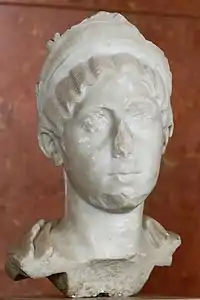 Bust of Julia Mamaea, Louvre | |||||||||
| Augusta of the Roman Empire | |||||||||
| Reign | 13 March 222 – 19 March 235 | ||||||||
| Predecessor | Julia Soaemias and Julia Maesa | ||||||||
| Successor | Caecilia Paulina | ||||||||
| Co-Augustae |
| ||||||||
| Born | After 180 AD Emesa, Syria | ||||||||
| Died | 235 AD Germania Superior | ||||||||
| Spouse |
| ||||||||
| Issue | Alexander Severus Theoclia | ||||||||
| |||||||||
| Dynasty | Severan | ||||||||
| Father | Gaius Julius Avitus Alexianus | ||||||||
| Mother | Julia Maesa | ||||||||
| Roman imperial dynasties | ||
|---|---|---|
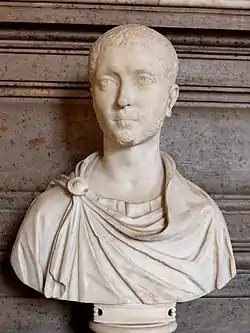 | ||
| Severan dynasty | ||
| Chronology | ||
| 193–211 | ||
| 198–217 | ||
| 209–211 | ||
|
Interlude: Macrinus 217–218 |
||
|
—with Diadumenian 218 |
||
| 218–222 | ||
| 222–235 | ||
| Dynasty | ||
| Severan dynasty family tree | ||
|
All biographies |
||
| Succession | ||
|
Family
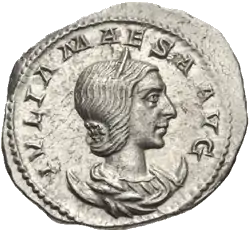
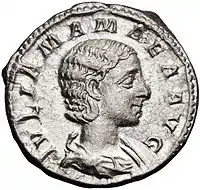
Julia Avita Mamaea was the second daughter of Julia Maesa, a powerful Roman woman of Syrian origin, and Syrian noble Gaius Julius Avitus Alexianus. She was a niece of empress Julia Domna, emperor Lucius Septimius Severus, and sister of Julia Soaemias Bassiana. She was born and raised in Emesa (modern Homs, Syria).
Julia's first husband was a former consul (whose name is unknown) who died. Julia married as her second husband Syrian Promagistrate Marcus Julius Gessius Marcianus.[1] Julia bore two children during her marriage to Marcianus, a daughter Theoclia and a son, Marcus Julius Gessius Bassianus Alexianus, later emperor Alexander Severus. Perhaps she may have had an elder son called Marcus Julius Gessius Bassianus.[2] Unlike her sister, Julia was described as virtuous and reportedly never involved in scandals. Julia was attentive to the education of her son, Alexander, whom she prepared adequately for becoming emperor of Rome. Alexander thought much of his mother's advice and followed what she told him to do.[3]
The Reign of Alexander
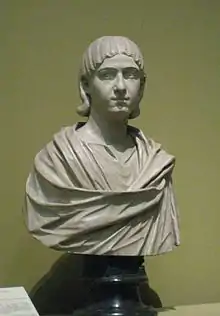
As a member of the imperial Roman family, under the authority of his aunt Julia Domna, she watched closely the death of her cousin Caracalla and the ascension of her nephew Elagabalus, the oldest grandson of Julia Maesa and initially, her favorite. Eventually Elagabalus and his mother Julia Soaemias alienated the Praetorian Guard and their favor fell on Alexander, Julia's son. He became emperor in 222, following Elagabalus' murder by the Praetorian Guard. Julia and her mother and were instrumental in the imperial accession of Alexander, then 13 years old, and became influential figures during his reign.
The two women collaborated in choosing 16 distinguished senators to form an advisory board[4] and relied heavily on the lawyer Ulpian, who was also from Syria. This created a court environment in which the advisory board ran the Roman Empire with Alexander as the mere figurehead. Ulpian was made head of the Praetorian Guard and became a powerful figure during Alexander's reign. However, he was unable to control the Praetorians and was murdered by them in 228.
Upon adulthood, Alexander confirmed his esteem for his mother and listened to her advice. She accompanied her son in his campaigns, and like her aunt Julia Domna, she too held many titles in addition to Augusta: mater Augusti nostri et castrorum et senatus et patriae, meaning "mother of the emperor, the camp, the senate and the country" and mater universi generis humani ("mother of the all humanity"). The historian Herodian characterizes Alexander as a mama's boy and that he never managed to escape her maternal domination but that he resented her love of money.[5]
According to the historian Herodian, Julia had become jealous of her son's wife, Sallustia Orbiana, whom Alexander married in 225, and whose father Seius Sallustius had been made Caesar, because she disapproved that there was another Augusta. Julia Mamaea had Barbia expelled from the palace and had her father executed, against the will of Alexander Severus, because his mother had too much influence over him and he obeyed all her orders. However, the same historian also credits Julia for selecting Sallustia Orbiana as an Augusta,[6] leading to a contradiction in his narrative of Julia Mamaea's involvement in Orbiana's downfall.
Julia called on Origen, the Alexandrian Christian leader, to provide her with instructions in Christian doctrine.[7]
Death
After an inconclusive expedition to repel a Persian invasion in 232, mother and son went north to deal with a German attack. Alexander so alienated the Rhine legions by his lack of military prowess and his inflexibility towards pay demands that the troops proclaimed Maximinus Thrax as emperor in 235.[8] Troops sent to kill Alexander found him clinging to his mother in a tent. Mother and son were butchered together, ending the Severan dynasty.[9]
Ancestry
| Ancestors of Julia Avita Mamaea | |||||||||||||||||||||||||||||||||||||||||||||||||||||||||||||||||||||||||||||||||||||||||||||||||||||||||||||||||||||||||||||||||||||||||||||||||||||||||||||||||||||||||||||||||||
|---|---|---|---|---|---|---|---|---|---|---|---|---|---|---|---|---|---|---|---|---|---|---|---|---|---|---|---|---|---|---|---|---|---|---|---|---|---|---|---|---|---|---|---|---|---|---|---|---|---|---|---|---|---|---|---|---|---|---|---|---|---|---|---|---|---|---|---|---|---|---|---|---|---|---|---|---|---|---|---|---|---|---|---|---|---|---|---|---|---|---|---|---|---|---|---|---|---|---|---|---|---|---|---|---|---|---|---|---|---|---|---|---|---|---|---|---|---|---|---|---|---|---|---|---|---|---|---|---|---|---|---|---|---|---|---|---|---|---|---|---|---|---|---|---|---|---|---|---|---|---|---|---|---|---|---|---|---|---|---|---|---|---|---|---|---|---|---|---|---|---|---|---|---|---|---|---|---|---|---|
| |||||||||||||||||||||||||||||||||||||||||||||||||||||||||||||||||||||||||||||||||||||||||||||||||||||||||||||||||||||||||||||||||||||||||||||||||||||||||||||||||||||||||||||||||||
See also
- Women in Ancient Rome
- Severan dynasty family tree
References
- Birley, Anthony Richard (1999). Septimius Severus: the African emperor. Routledge. p. 222. ISBN 978-0-415-16591-4. Retrieved 2010-01-18.
- Birley, Septimius Severus: The African Emperor, p.217&222
- A Cyclopedia of Female Biography, Julia Mamea, Henry Gardiner Adams, editor, Kessinger Publishing, 2007, Pg. 426.
- Herodian 6.1.1
- Herodian 6.1.8
- Herodian 6.1.9
- The Emergence of Christianity, Cynthia White, Greenwood Press, 2007, Pg. 14.
- Herodian, 6:8
- Herodian, 6:9
External links
| Wikimedia Commons has media related to Julia Avita Mamaea. |